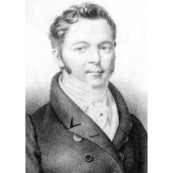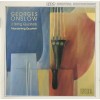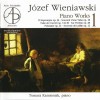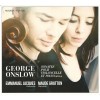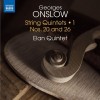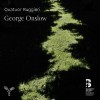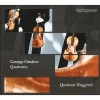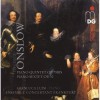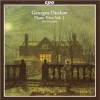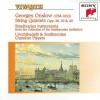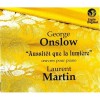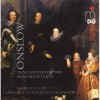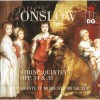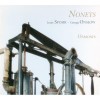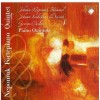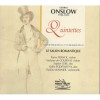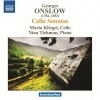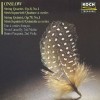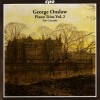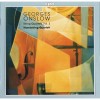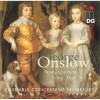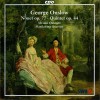Composers
André George Louis Onslow (27 July 1784 – 3 October 1853) was an Anglo-French composer. He was widely recognised as a gifted composer during his lifetime but is virtually forgotten today.
George Onslow was born in Clermont-Ferrand, the son of an English father, Edward Onslow, and a French mother; his paternal grandfather was George Onslow, 1st Earl of Onslow. As a young man he lived in London, where he studied piano with Johann Baptist Cramer and also studied composition with Dussek. His principal composition teacher was Anton Reicha with whom he studied in Paris between 1807–1808; later he spent two years studying in Vienna and was again a student of Reicha in the 1820s, when he wished to broaden his technique to write opera. He died in Clermont-Ferrand.
His 36 string quartets and 34 string quintets were, during his own lifetime and up to the end of the 19th century, held in the highest regard, particularly in Germany, Austria and England, where he was regularly placed in the front rank of composers. His work was admired by both Beethoven and Schubert, the latter modelling his own 2-cello quintet (D.956) on those of Onslow and not, as is so often claimed, on those of Boccherini. Robert Schumann, perhaps the foremost music critic during the first part of the 19th century, regarded Onslow’s chamber music on a par with that of Mozart, Haydn and Beethoven. Mendelssohn was also of this opinion. Publishers such as Breitkopf & Härtel and Kistner were among many who competed to bring out his works. Such was Onslow’s reputation that he was elected to succeed Luigi Cherubini as Director of the prestigious Académie des beaux-arts, based on the excellence of his chamber music and this, in an “Opera Mad France”, which had little regard for chamber music. However, after the First World War, his music, along with that of so many other fine composers, fell into oblivion and up until 1984, the bicentennial of his birth, he remained virtually unknown. Onslow’s writing was unique in that he was successfully able to merge the drama of the opera into the chamber music idiom perfected by the Vienna masters.
Besides his string quartets and quintets which were and remain his best known and regarded works, he wrote 10 piano trios, three piano quintets, a quintet for piano and winds, 2 sextets for winds and piano, a septet for winds and piano, a nonet for strings & winds, 6 sonatas for violin and piano, and one for cello and piano.
Beyond his chamber music, he composed four symphonies, four operas (including at least one, Le Colporteur, themes from which formed the subject of fantasies by other composers, like Friedrich Kuhlau's for flute and piano), several works for piano alone as well as five vocal works. His second symphony (D minor, opus 42) shows some commonality of style with Beethoven, particularly in the dramatic first movement, and with Schubert.
Recently Added
Biography
André George Louis Onslow (27 July 1784 – 3 October 1853) was an Anglo-French composer. He was widely recognised as a gifted composer during his lifetime but is virtually forgotten today.
George Onslow was born in Clermont-Ferrand, the son of an English father, Edward Onslow, and a French mother; his paternal grandfather was George Onslow, 1st Earl of Onslow. As a young man he lived in London, where he studied piano with Johann Baptist Cramer and also studied composition with Dussek. His principal composition teacher was Anton Reicha with whom he studied in Paris between 1807–1808; later he spent two years studying in Vienna and was again a student of Reicha in the 1820s, when he wished to broaden his technique to write opera. He died in Clermont-Ferrand.
His 36 string quartets and 34 string quintets were, during his own lifetime and up to the end of the 19th century, held in the highest regard, particularly in Germany, Austria and England, where he was regularly placed in the front rank of composers. His work was admired by both Beethoven and Schubert, the latter modelling his own 2-cello quintet (D.956) on those of Onslow and not, as is so often claimed, on those of Boccherini. Robert Schumann, perhaps the foremost music critic during the first part of the 19th century, regarded Onslow’s chamber music on a par with that of Mozart, Haydn and Beethoven. Mendelssohn was also of this opinion. Publishers such as Breitkopf & Härtel and Kistner were among many who competed to bring out his works. Such was Onslow’s reputation that he was elected to succeed Luigi Cherubini as Director of the prestigious Académie des beaux-arts, based on the excellence of his chamber music and this, in an “Opera Mad France”, which had little regard for chamber music. However, after the First World War, his music, along with that of so many other fine composers, fell into oblivion and up until 1984, the bicentennial of his birth, he remained virtually unknown. Onslow’s writing was unique in that he was successfully able to merge the drama of the opera into the chamber music idiom perfected by the Vienna masters.
Besides his string quartets and quintets which were and remain his best known and regarded works, he wrote 10 piano trios, three piano quintets, a quintet for piano and winds, 2 sextets for winds and piano, a septet for winds and piano, a nonet for strings & winds, 6 sonatas for violin and piano, and one for cello and piano.
Beyond his chamber music, he composed four symphonies, four operas (including at least one, Le Colporteur, themes from which formed the subject of fantasies by other composers, like Friedrich Kuhlau's for flute and piano), several works for piano alone as well as five vocal works. His second symphony (D minor, opus 42) shows some commonality of style with Beethoven, particularly in the dramatic first movement, and with Schubert.
